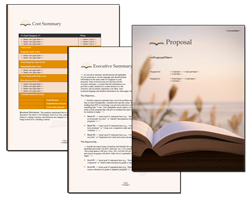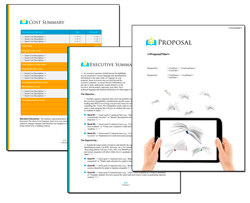
Unlock the Deal: How to Write a Book Proposal That Publishers Can't Ignore
Writing book proposals is a must if you're determined to see your work in print. This concise guide takes you through how to write a book proposal with precision, from sharpening your pitch to polishing the final draft - each step is broken down into actionable segments. Learn how to convincingly pitch your book's unique angle, build an author profile, and devise a marketing strategy that sells. Start here to transform your idea into a publisher-ready proposal.
Key Takeaways
- A successful book proposal should communicate the book's unique value, tailored content, and professional design and include a structured outline that speaks the genre's language.
- The proposal must contain an overview with a hook, establish the author's authority and expertise, and highlight the book's uniqueness to distinguish it from existing works. Additionally, having a literary agent can be crucial for submitting the proposal to traditional publishers.
- An author's proposal should outline a robust marketing plan, present a detailed roadmap with chapter breakdown and sample chapters, and undergo thorough proofreading, peer reviews, and professional editing before submission.
Types of Book Publishing Proposals

Here are some types of business proposals commonly written for book publishing companies and authors:
- Manuscript Acquisition Proposals: Proposals for acquiring new manuscripts from authors, detailing the potential market, target audience, and projected sales.
- Print and Digital Publishing Proposals: Plans for publishing books in both print and digital formats, including strategies for distribution and marketing.
- Author Partnership Proposals: Proposals to establish long-term partnerships with authors, offering support services such as editing, marketing, and promotional tours.
- Translation and International Rights Proposals: Proposals to translate and publish books in multiple languages for international markets, including rights management and distribution strategies.
- Marketing and Promotional Campaign Proposals: Detailed plans for marketing and promoting new book releases, including social media campaigns, book tours, and media outreach.
- Self-Publishing Assistance Proposals: Offering services to assist authors with self-publishing, including editing, design, distribution, and marketing support.
- Educational Publishing Proposals: Plans for publishing educational materials, textbooks, and academic resources, targeting schools, universities, and educational institutions.
- Subscription-Based Publishing Proposals: Proposing subscription models for readers, providing access to a curated selection of books monthly or yearly.
- Graphic Novels and Illustrated Books Proposals: Proposals for producing and publishing graphic novels and illustrated books, including collaboration with artists and illustrators.
- Audiobook Production Proposals: Plans for producing and distributing audiobooks, including details on narration, production quality, and platform partnerships.
Creating Your Pitch: The Essentials of a Book Proposal
Creating a winning book proposal is akin to laying the foundation of a house; it requires precision, expertise, and the right tools. With Proposal Kit, you're equipped with structured templates that guide you through each required page, ensuring your proposal showcases the unique value of your book idea.
From the significance of the book's content to the meticulous preparation for submission, everything converges on one goal: securing a book deal. Writing book proposals is essential for communicating your idea to a publisher, especially in the competitive publishing industry.
Choosing the Right Template

Selecting the right template is your first move. While some pre-made templates will work, most proposals must be custom-created to ensure they include all the topics needed for the specific situation. This is where Proposal Kit shines, allowing you to start with a pre-made layout and customize it with your unique set of chapters. With Proposal Kit's customizable templates, you can spotlight your book's strengths, demonstrating to publishers why you are the right person for this book project.
Tailoring Your Content
Your unique voice will help you reach readers and stand out in a market filled with aspiring authors. Tailor your proposal to reflect your book's distinctiveness and individuality as a writer, ensuring your content resonates deeply with your target audience.
Design Matters
They say never to judge a book by its cover, but design is a potent selling point in proposals. The design themes from Proposal Kit enhance your book proposal's aesthetic, ensuring its quality matches the marketing plan. You can customize the Proposal Kit design themes or create your own using the Professional edition branding features.
The Cornerstone of Your Proposal: Creating a Compelling Overview
The overview is the cornerstone of your proposal, a high-level snapshot that encapsulates your book's theme, topic, and intended audience. It's more than just a summary; it's a pitch, a promise, and a glimpse into the heart of your work.
Most book proposals are the bridge between an idea and its fruition; make yours the one that leads to a successful book proposal by learning how to write one.
The Hook
A well-written hook is a literary seduction; it's brief, vibrant, and leaves the reader wanting more. Think of it as:
- the story on the back cover of your published book
- an invitation into an intriguing world
- a striking premise
- an introduction to your protagonist or central theme
But remember, don't give it all away.
Establishing Authority

Authority in a book proposal is established through anecdotes and expertise, showcasing your command over the subject and ability to engage readers. It's about sharing your story in a way that positions you as the right person to address the topic, giving a glimpse of your platform and your alignment with the book's concept.
Highlighting Uniqueness
Your book's uniqueness is its path to success. It solves a problem, fills a gap, and claims its space on the shelf. Use the overview to articulate how your book updates, challenges, or enhances similar books' common elements and why they're needed in the market.
Identifying Your Readers: Defining the Target Audience
Knowing your readers is as crucial as knowing your content. Your proposed book needs to speak directly to its book buyers, whether they are aspiring authors or seasoned veterans in the subject matter. By identifying a specific target market, you enhance your book's potential audience and refine your reach to genuinely interested readers.
Market Size and Demographics
Understanding the demographics of your target audience is like having a clear idea of who will attend your book's grand opening. Gather detailed information like age, occupation, and interests to estimate your book's potential audience and ensure your marketing plan addresses the right crowd.
Understanding Reader Needs
Your book proposal must resonate with the intended readership by addressing their needs and interests. Here are some key points to consider:
- Highlight your unique perspective and expertise
- Show how your book will benefit potential readers
- Explain how your book will stand out in the crowded marketplace
Focusing on these aspects can help you create a book proposal that will capture the attention of publishers and readers alike.
Positioning Against Competitors

Your proposal must demonstrate how your idea differs from and improves upon existing works. Competitive title analysis is about respect and positioning; articulate how your book complements yet stands apart from competitive titles, ensuring it remains unique and valuable.
Building Your Author Platform: The Author Bio Section
The author bio is where your credentials meet your story, telling publishers and readers why you are the best person to write this book. It should be a brief bio that serves as a summary of your authority and platform.
Briefly Summarize Your Credentials
Your credentials are not just a list of achievements; they are proof of your relevant experience, journey, and expertise. Include only those that underscore your authority and are directly related to your book concept.
Engaging Storytelling
Engage readers with stories that mirror the theme of your proposed book, allowing them to see the world through your eyes.
A well-told story in your bio can connect with readers personally and enhance your author's platform.
Proof of Platform
In today's self-publishing landscape, a robust author platform is non-negotiable. Demonstrate your ability to reach readers and your presence on the platforms that matter, showing that you have the reach to promote your book effectively.
Here are some related samples included in every downloadable Proposal Pack
Here are some related downloadable templates
Marketing Blueprint: Outlining Your Marketing Plan
A robust marketing plan is the engine that drives book sales. Your proposal should present a clear and confident plan, complete with:
- Sales strategy
- Promotional activities
- Showcasing your book's commercial appeal
- How you intend to convince agents and readers of its worth.
Sales Strategy
Your sales strategy is your battle plan for the marketplace. It should outline actionable steps and projected sales figures, indicating a clear business plan that aligns with your book's concept and target market.
Promotional Activities
Detail your promotional activities in your marketing plan. These activities may include:
- Book tours
- Social media campaigns
- Online advertising
- Email marketing
- Influencer partnerships
Describe how these activities will engage your target audience and work in tandem with the publisher's marketing efforts.
Measuring Success
Define benchmarks for success, using analytics to track the performance of your marketing efforts. Some key metrics to consider include:
- Pre-order sales targets
- Social media engagement (likes, shares, comments)
- Website traffic and conversion rates
- Email open and click-through rates
- Customer feedback and reviews
These figures will help you assess the impact of your promotional activities and refine your strategy for future success.
The Roadmap: Outlining Chapters and Providing Samples

The roadmap of your book proposal consists of a detailed chapter outline and sample chapters that showcase your writing skills and the book's content. This section is your opportunity to provide a sneak peek into the proposed book, revealing its structure and compelling narrative.
Chapter Breakdown
Construct a table of contents that maps out your book's journey, with each chapter summary providing a glimpse into the narrative's unfolding. Keep it brief and reflective of the book's style and tone.
Sample Chapter Selection
Choose sample chapters that best represent your book concept and demonstrate your storytelling prowess. These early pages should leave agents interested in reading the entire book.
Formatting for Impact
Your book proposal's formatting should be professional and impactful, mirroring the polished look of a published book. Make sure it adheres to industry standards and showcases your book's potential.
The Final Check: Proofreading and Reviewing Your Proposal
Before you submit your proposal, give it a final check. Proofreading and reviewing are critical steps to ensure your proposal is polished and error-free. Consider it the last coat of paint before you unveil your masterpiece.
Peer Reviews

Engage trusted colleagues or mentors to review your proposal according to submission guidelines. Their feedback can enhance the quality and clarity of your document, ensuring it is ready for the eyes of literary agents and publishers.
Professional Editing
Enlist the services of a professional editor to refine your proposal. Their expertise will ensure your proposal is coherent, grammatically correct, and consistently styled.
Last Look
Take a last look at your proposal to catch any lingering errors. This final review guarantees that the document is ready for submission, as flawless as the back cover of your soon-to-be-published book.
Summary
In conclusion, writing a book proposal is a meticulous process that requires careful planning, a deep understanding of the market, and a clear vision of your book's potential. Your proposal is more than just a document; it represents your passion for writing and commitment to your book's success. Let this guide be the compass that helps you navigate the intricate world of publishing, and may your journey end with a book deal in hand.
 Proposal Kit Professional provides the most content, including legal contracts and a free design theme pack. Plus, advanced software features include custom branding and customizable quoting databases.
Proposal Kit Professional provides the most content, including legal contracts and a free design theme pack. Plus, advanced software features include custom branding and customizable quoting databases. Proposal Pack for Any Business covers this type of proposal and includes samples. There are also some commonly used specialty design themes available:
Proposal Pack for Any Business covers this type of proposal and includes samples. There are also some commonly used specialty design themes available:Photo Design Proposal Packs
Line Art Design Proposal Packs
Frequently Asked Questions
What is a book proposal?
A book proposal is a detailed document used to pitch ideas to publishers. It outlines information about the book, author, target audience, and competition to demonstrate its value and market potential.
What should be included in a book proposal?
A book proposal should include a cover letter, title page, summary/concept page, market and audience description, author's bio, market study, detailed outline, sample chapters, and reviews or testimonials from relevant sources.
How should a book proposal be proofread?
To ensure a flawless book proposal, proofread the content and consider having another person review it for any overlooked mistakes. This will help showcase your expertise effectively.
How can Proposal Kit assist with writing a book proposal?
Proposal Kit can assist with writing a book proposal by providing templates for all the necessary pages, instructions, examples, and professional graphic designs to enhance its visual appeal. This makes creating a book proposal more efficient and visually compelling.
Why is the author bio important in a book proposal?
The author bio is essential in a book proposal because it establishes the author's credibility, showcases their relevant experience, and connects with the reader personally. It's integral to building the author's platform and demonstrating their ability to reach readers.



 Cart
Cart
 Are you just looking for a template, sample, or software for your book publishing proposals? Click these links to skip down the page and get right to it.
Are you just looking for a template, sample, or software for your book publishing proposals? Click these links to skip down the page and get right to it.









 Facebook
Facebook YouTube
YouTube X
X Search Site
Search Site